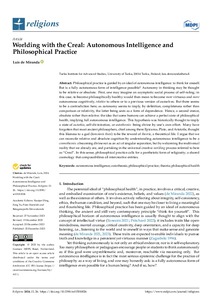Worlding with the Creal: Autonomous Intelligence and Philosophical Practice
de Miranda Luis
https://urn.fi/URN:NBN:fi-fe2025082790861
Tiivistelmä
Philosophical practice is guided by an ideal of autonomous intelligence: to think for oneself. But is a fully autonomous form of intelligence possible? Autonomy in thinking may be thought to be relative or absolute. First, one may imagine an asymptotic social process of self-ruling; in this case, to become philosophically healthy would then mean to become more virtuous and more autonomous cognitively, relative to others or to a previous version of ourselves. But there seems to be a contradiction here, as autonomy seems to imply, by definition, completeness rather than comparison or relativity, the latter being seen as a form of dependence. Hence, a second stance, absolute rather than relative: the idea that some humans can achieve a perfect state of philosophical health, implying full autonomous intelligence. This hypothesis was historically thought to imply a state of autarkia, self-divinization, or autotheosis: being divine by one’s own effort. Many have forgotten that most ancient philosophers, chief among them Epicurus, Plato, and Aristotle, thought this likeness to a god (homoiosis theoi) to be the reward of theoria, a theoretical life. I argue that we can reconcile relative and absolute cognition by understanding autonomous intelligence to be a cosmotheosis: a becoming divine not as an act of singular separation, but by welcoming the multiversal reality that we already are, and partaking in the universal creative worlding process referred to here as “Creal”. In this sense, philosophical practice calls for a pantheistic form of religiosity; a shared cosmology that compossibilizes all intercreative entities.
Kokoelmat
- Rinnakkaistallenteet [27094]
